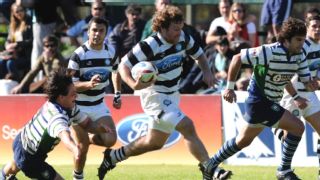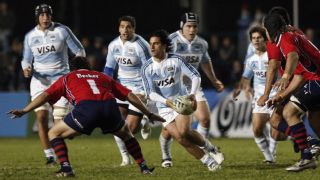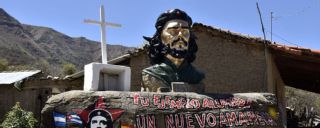|
Even the smartest and subtlest critics sometimes exaggerate for effect. Chris Laidlaw counts as smart and subtle, on and off the field, but the former All Black scrum-half was overstating the case when he argued, in his polemical autobiography "Mud in Your Eye" that rugby union is "universally an establishment activity... normally played and administered by the conservative elements in society." It is "universally" that is the problem. Laidlaw played in All Black sides alongside Ken Gray, who combined being one of the finest prop forwards in history with a long history of activism. He knew first hand about the rugby and political cultures of South Wales and southwest France and will certainly have been aware -- at least in political terms -- of the most famous left-wing rugby player of all, Argentine revolutionary Ernesto "Che" Guevara, who died in Bolivia 50 years ago this week, on Oct. 9, 1967. If, as the World Museum of Rugby recently suggested, Nelson Mandela presenting the Rugby World Cup trophy to Francois Pienaar in 1995 is the most iconic of sporting images, it is arguably trumped by the endlessly reproduced picture of a beret-toting Guevara as the most famous image of anyone known to have played rugby. Half a century ago the world woke up to another famous image -- Guevara's body laid out after his execution by the Bolivian army at Vallegrande. It was the end of a short but hugely eventful life in which rugby played a considerable part. That he was attracted to the game is hardly surprising. Rugby was the game of Argentina's anglicised middle-class and his parents were members of the San Isidro club whose rugby section was, at the time of his birth in 1928, in the later stages of a run of 14 consecutive national championships between 1917 and 1930. Becoming a medical student made him still more the archetypal Argentine rugby player. But a complicating factor was his lifelong asthma, and the fear that the violent exercise inherent in rugby would bring on a devastating attack. When young Ernesto developed a passion for the game as a schoolboy in Cordoba, his father told him that he should give up for precisely this reason, only to be told: "I love rugby. Even if it kills me one day, I am happy to play it."  His lifelong friend Alberto Granados remembered him as having "an excellent tackling game at the height of the elbow." Pictures from the time show him wearing a scrum-cap, while the game's stop-start rhythms allowed him periodically to step away to use an inhaler or inject himself. As a student he played variously for San Isidro, Ypora and Atalaya Polo Club. His biographer Jorge Castaneda records that playing scrum-half had implications which stretched well beyond the rugby field, offering "the great advantage of being more static and strategic, less mobile and tactical. It benefitted him in two ways, offering him an opportunity to develop his skills as a leader and strategist, and allowing him to play without running from one end of the field to the other throughout a match, thus preventing him from tiring too early." As well as developing his strategic sense, rugby developed him as a polemicist. In 1951 he launched a rugby magazine Tackle, writing the whole thing himself. He was not yet the committed revolutionary ideologue he would become. But the vigorous critic of established orders was evident in his complaints about the conservative tactics of Argentine rugby, which he contrasted unfavourably with the play of visiting French and English teams, writing that "well-played rugby is spectacular, but a closed game is usual in our provinces. If people could see teams playing a more open game, then rugby would command more supporters." And it was a more explicit critique of the conservatism and exclusivity of Argentine rugby which prompted interest from General Peron's police -- ever-alert to the slightest sign of subversion -- the closure of the paper after four months and his departure with Granados on their famous motorcycle journey across Latin America. Those travels brought exposure to the horrific inequalities of his native continent and the life-changing encounter with Fidel Castro in Mexico City which led to his becoming one of the key figures of the Cuban Revolution. Rugby, inevitably, lost out to the demands of revolutionary life and then government.  Yet accounts of a memorable night in Limerick in 1965 after his flight developed engine trouble and was forced, to the diplomatic alarm of the Irish government, to land at Shannon Airport suggest that he never lost interest in the game. Granados remained a fan, and patron of Cuban rugby, until his death a few years ago in his nineties. More than one writer speculated, when the 40th anniversary of his death coincided with Argentina's run to the semifinals of the 2007 World Cup, that a different turn of fate might instead have found Guevara as a veteran scribe on the press tribunes of the Stade de France and Parc des Princes, recognising that memorable breakthrough as fulfilling his prediction in 1951 that if rugby spread beyond its traditional heartlands "Argentina could have its place in the international hierarchy." Too committed a Marxist to give any credence to the notion of reincarnation, he might still have recognised a fellow spirit in that Argentine team -- its captain Agustin Pichot was not only a scrum-half, but was born, in 1974, in the same Buenos Aires suburb and played his formative rugby for San Isidro. It was a resemblance Pichot was proud to acknowledge. An inherent sense of proportion meant that he recognised the difference between seeking to transform entire societies and winning even the most momentous rugby matches, but he said that "I'm proud to be his compatriot" and called him "Argentina's emblematic figure." A decade on, Pichot's role as vice-chairman of World Rugby makes him one of the most powerful figures in the game. He explicitly rejects political violence and the Cuban model of government, but says of Guevara: "What I respect is that he always stood up for his beliefs and against injustice and inequality. He would die for whatever he really felt. I always have him very present." Guevara would find much to dislike in the world of 2017. But he might have been pleased to see another Argentine scrum-half acting as a highly practical reformer and voice for the world's developing nations in the game that played such an important part in his life.
|

